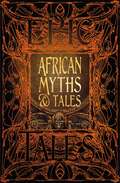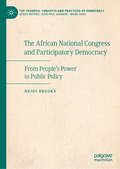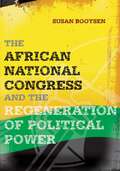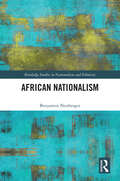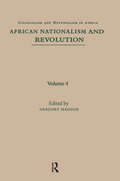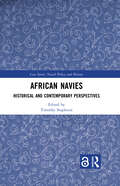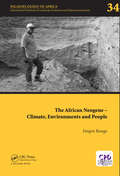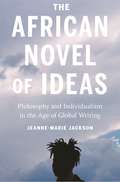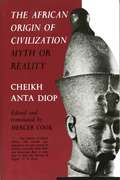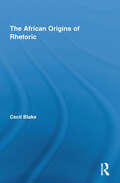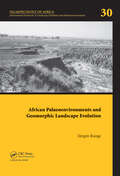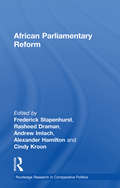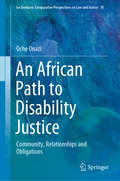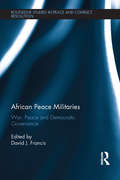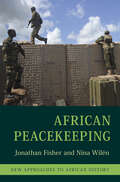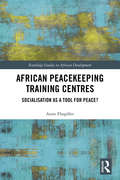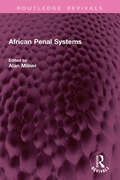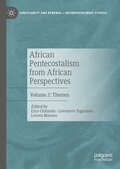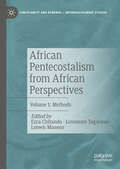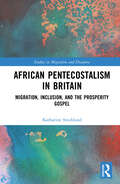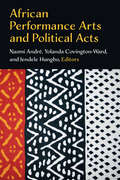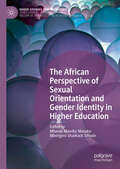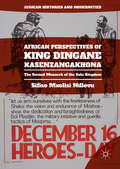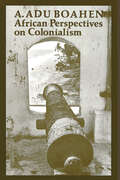- Table View
- List View
African Myths & Tales: Epic Tales (Gothic Fantasy)
by Flame Tree StudioAfrica south of the Sahara is a land of wide-ranging traditions and varying cultures. Despite the diversity and the lack of early written records, the continent possesses a rich body of folk tales and legends that have been passed down through the strong custom of storytelling and which often share similar elements, characters and ideas between peoples. So this collection offers a hefty selection of legends and tales – stories of the gods, creation and origins, trickster exploits, animal fables and stories which entertain and edify – from &‘Obatala Creates Mankind&’, from the Yoruba people of west Africa, to &‘The Girl Of The Early Race, Who Made Stars&’, from the San people of southern Africa, all collected in a gorgeous gold-foiled and embossed hardback to treasure.
The African National Congress and Participatory Democracy: From People's Power to Public Policy (The Theories, Concepts and Practices of Democracy)
by Heidi BrooksThis book examines the development of democratic thought in the African National Congress (ANC) of South Africa, with a focus on the movement’s ideas about participatory democracy. It makes particular reference to two key periods: the 1980s ‘people’s power’ movement and the subsequent years of policy formulation from 1990 when the ANC began to design and implement a system of participatory democracy alongside a representative government. Through the examination of historic documents and in-depth interviews with former ANC activists, government officials and those involved in policy development, the author explores the inspiration for the party’s commitment to establishing participatory democracy. The book combines democratic theory and political and intellectual history to look at the role of popular participation as part of a broader trajectory of the ANC’s democratic thought. It critically engages with concepts used in the party’s participatory discourse with a view to deepening our understanding of how ideas have shaped the construction of South Africa’s democracy.
The African National Congress and the Regeneration of Political Power
by Susan BooysenThe African National Congress is light years beyond the liberation movement of old. It remains a juggernaut, but its control and dominance are no longer watertight. The ANC lives the contradictions of weaknesses, cracks and factions while retaining its colossal status. As a party-movement it draws on its liberation credentials, and extracts immense power from its deep anchorage in South Africa’s people. It is immersed in electoral politics that marks the state of its overwhelming power cyclically. As government the ANC is the object of protest, but not protest designed to bring the ruling party to its knees. The ANC is in command of the state, yet fails to definitively counter the deficits that make South Africa’s democracy seem so diluted. Its incredulous and thus far trusting supporters condemn but only rarely punish deployees who do not ‘pass through the eye of the needle’.The ANC and the Regeneration of Political Power unpacks these contradictions. It focuses on four faces of the ANC’s political power – the organisation, the people, political parties and elections, and policy and government – and explores how the ANC has acted since 1994 to continuously regenerate its power. By 2011-12 the power configurations around the ANC were converging to a conjuncture holding vexing uncertainties. This book presents insights into how South African politics – in many ways synonymous with the politics of the ANC – is likely to unfold in years and possibly decades to come.
African Nationalism (Routledge Studies in Nationalism and Ethnicity)
by Benyamin NeubergerAfrican Nationalism offers an innovative perspective on the creation of nations and nationalism, and the role of race in nationalism overall, by bringing together a compilation of debates on African nationalism, from Pan-Africanism up to the present day. The book examines African nationalism in comparative perspective, mainly with the UK, France, and the US: the birthplaces of modern nationalism. The author suggests that the origins of African nationalism lay outside the continent and demonstrates the similarities that abound between African nationalisms across a diverse range of countries. This volume is important reading for students and scholars of nationalism, history, political science, and African studies.
African Nationalism and Revolution (Colonialism And Nationalism In Africa Ser. #Vol. 4)
by Gregory MaddoxThe study o f African history as an academic discipline is a rather new field and one that still has its detractors both w ithin and outside academics. This collection o f articles highlights for students and scholars the modern era in African history. It brings together published research on the colonial era in Africa, an era relatively brief but one that sawdramatic change in African societies.
African Navies: Historical and Contemporary Perspectives (Cass Series: Naval Policy and History)
by Timothy StapletonThis edited volume focuses on aspects of the understudied theme of African sea-power, including African navies and the engagement of non-African navies with the continent. Africa possesses 48,000 kilometers of coastline, comprising 38 out of 54 of the continent’s states and several strategic choke points for international shipping, such as the Suez Canal, the Gulf of Aden and the Cape of Good Hope. Nevertheless, post-colonial Africa’s small navies and their relations with the navies of external powers have not received much scholarly attention. Focusing on Sub-Saharan Africa, this collection attempts to address this neglect and stimulate further research by offering original chapters related to historical and contemporary themes around Africa’s navies. The historical chapters cover the origin of the Tanzanian, Ethiopian, Nigerian and Ghana navies during the era of decolonization and the Cold War, the asymmetrical naval campaign fought during the Nigerian Civil War (1967-70), and the activities of the Soviet Navy in supporting African states and movements fighting lingering colonialism and white supremacy during the 1970s and 1980s. Focusing on the contemporary situation, other chapters discuss the engagement of the Indian Navy with Africa, the potential role of the Angolan and Mozambican navies in the Southern African Development Community (SADC), the transformation and development of the post-apartheid South African Navy, and the challenges and capabilities of African navies in the early twenty-first century. The book concludes by discussing the question of whether African coastal countries need navies. This book will be of much interest to students of naval power, strategic studies, African politics and International Relations.
The African Neogene - Climate, Environments and People: Palaeoecology of Africa 34 (Palaeoecology of Africa #34)
by Jürgen RungeDuring the Neogene – covering the last 23 Million years – the evolution of the environmental setting in Africa was subject to considerable changes. Natural shifts, slow and rapid, evidenced by modifications in palaeogeography, geodynamics, climate, and vegetation have caused repeated and strong changes of ecosystems in the lower latitudes. Using a variety of proxy data – researched and applied by many authors from numerous disciplines – an attempt is made to reconstruct African landscapes over space and time. Besides such spatio-temporal oscillations in recently humid, semi-humid, and dry areas of Africa, this volume of Palaeoecology of Africa (PoA) focuses on long term interrelationships between ecosystem dynamics and climate change, not ignoring the ever growing and ongoing influence of humans on natural ecosystems since the Quaternary. Regionally, this volume lays a strong focus on Nigeria (Niger Delta). Facing the omnipresent challenges of Global Change, an increasing number of African scientists is involved in palaeoenvironmental and palaeoclimatic research, both theoretical and applied. PoA systematically supports established as well as junior African scientists in the field of sustainable cooperation and academic capacity building. This book will be of interest to all concerned with or interested in up-to-date research on Neogene to Quaternary low latitudes ecosystem changes and their respective interpretation in the framework of natural climate and vegetation change evidenced by a variety of methods that allow to read and learn from the past by following the motto, "The geologic foretime as the key to the present, and possibly to the future." Palynologists, Geologists, Geographers, Archaeologists, and Geomorphologists will find this edition equally useful for their work.
The African Novel of Ideas: Philosophy and Individualism in the Age of Global Writing
by Jeanne-Marie JacksonAn ambitious look at the African novel and its connections to African philosophy in the twentieth and twenty-first centuriesThe African Novel of Ideas focuses on the role of the philosophical novel and the place of philosophy more broadly in the intellectual life of the African continent, from the early twentieth century to today. Examining works from the Gold Coast, South Africa, Uganda, and Zimbabwe, and tracing how such writers as J. E. Casely Hayford, Imraan Coovadia, Tendai Huchu, Jennifer Nansubuga Makumbi, and Stanlake Samkange reconcile deep contemplation with their social situations, Jeanne-Marie Jackson offers a new way of reading and understanding African literature.Jackson begins with Fante anticolonial worldliness in prenationalist Ghana, moves through efforts to systematize Shona philosophy in 1970s Zimbabwe, looks at the Ugandan novel Kintu as a treatise on pluralistic rationality, and arrives at the treatment of “philosophical suicide” by current southern African writers. As Jackson charts philosophy's evolution from a dominant to marginal presence in African literary discourse across the past hundred years, she assesses the push and pull of subjective experience and abstract thought.The first major transnational exploration of African literature in conversation with philosophy, The African Novel of Ideas redefines the place of the African experience within literary history.
The African Origin of Civilization: Myth or Reality
by Cheikh Anta Diop Mercer CookNow in its 30th printing, this classic presents historical, archaeological, and anthropological evidence to support the theory that ancient Egypt was a black civilization.
The African Origins of Rhetoric (African Studies)
by Cecil BlakeThrough a critical analysis of ancient African texts that predate Greco-Roman treatises Cecil Blake revisits the roots of rhetorical theory and challenges what is often advanced as the "darkness metaphor" -- the rhetorical construction of Africa and Africans. Blake offers a thorough examination of Ptah-hotep and core African ethical principles (Maat) and engages rhetorical scholarship within the wider discourse of African development. In so doing, he establishes a direct relationship between rhetoric and development studies in non-western societies and highlights the prospect for applying such principles to ameliorating the development malaise of the continent.
African Palaeoenvironments and Geomorphic Landscape Evolution: Palaeoecology of Africa Vol. 30, An International Yearbook of Landscape Evolution and Palaeoenvironments (Palaeoecology of Africa)
by Jürgen RungeThis 30st jubilee volume (2010) of "Palaeoecology of Africa" looks back and reflects the "state of the art" of what is actually known on former African climates and ecosystems in the format of review articles authored by specialists in the field. New research articles on climate and ecosystem dynamics as well as applied topics on geomorphic ha
African Parliamentary Reform (Routledge Research in Comparative Politics)
by Alexander Hamilton Rick Stapenhurst Rasheed Draman Andrew Imlach Cindy KroonSome of the most far-reaching and innovative parliamentary reform is occurring in Africa. While these reforms are not yet widespread across the continent, parliaments in some African countries are asserting their independence as policymakers, as overseers of government and as the guardian of citizens’ rights and needs. This book presents recent reforms in selected African parliaments – Ghana, Kenya, Uganda, Tanzania, Rwanda, Benin, Zambia, Ethiopia, Liberia and Nigeria. It also presents cross-cutting innovations by African parliaments – in fighting corruption, in providing development to constituents and in combatting climate change. Many of the chapters are authored by African MPs themselves, making this a book ‘by MPs for MPs’, as well as being of interest to students and scholars of African Politics, and to those international institutions that support parliamentary development. African Parliamentary Reform is a joint initiative by the World Bank Institute, the Commonwealth Parliamentary Association and the Parliamentary Centre (Africa).
An African Path to Disability Justice: Community, Relationships and Obligations (Ius Gentium: Comparative Perspectives on Law and Justice #78)
by Oche OnaziHow should disability justice be conceptualised, not by orthodox human rights or capabilities approaches, but by a legal philosophy that mirrors an African relational community ideal? This book develops the first comprehensive answer to this question through the contemporary literature on African philosophy, which is relied upon to construct a legal philosophy of disability justice comprising of ethical ideals of community, human relationships and obligations. From these ideals, an African legal philosophy of disability justice is offered as a criterion for critically evaluating existing laws, legal and political institutions, as well as providing an ethical basis for creating new ones to ensure that they are inclusive to people with disabilities. In taking an alternative perspective on the subject, the book outlines and emphasises the need for a new public culture of obligations owed to people with disabilities, highlighting both the prospects and difficulties of achieving the ideal of disability justice that continues to elude the lived experiences of millions of Africans today. Oche Onazi's An African Path to Disability Justice is the first book-length exploration of disability in the light of African ethics, as contrasted with the human rights and capabilities frameworks. Of particular interest are Onazi's thoughtful reflections on how various conceptions of community salient in African moral philosophy––including group-based, reciprocal and relational––bear on what we owe to the disabled. --Thaddeus Metz, Distinguished Professor, University of Johannesburg
African Peace Militaries: War, Peace and Democratic Governance (Routledge Studies in Peace and Conflict Resolution)
by Edited by David J. FrancisThis book provides a critical understanding of the emerging role of African militaries in peacetime democratic Africa. This book departs from the dominant perspective which simply presents the military as an ‘enemy’ of democracy because of the history and legacy of unending military coup d’états and interventions in civilian politics. In the context of Africa, the military has been blamed or largely held responsible for instigating wars, armed conflicts, political violence, poverty and underdevelopment due to bad governance and mismanagement of the state. Drawing from diverse case studies across Africa, including Nigeria, Rwanda, Uganda, Ethiopia and Egypt, this volume presents the argument that though the military has played a negative, and sometimes, destructive role in undermining constitutional rule and the overthrow of democratic civilian governments, the same military, now operating in a changed global environment, is making effort to support the development of democracy and democratic consolidation as well as remain subjected to civilian democratic oversight and control. Notwithstanding, the real challenge for this emerging trend of African peace militaries is the extent to which they are able to fulfil, on a predictable and consistent basis, their constitutional mandate to defend the people against ‘elected autocrats’ in Africa who try to use the military to perpetuate themselves in power. This work fills a critical gap in the literature and will be of much interest to students of African security and politics, peace and conflict studies, security studies and IR in general.
African Peacekeeping (New Approaches to African History #17)
by Jonathan Fisher Nina WilénExploring the story of Africa's contemporary history and politics through the lens of peacekeeping, this concise and accessible book, based on over a decade of research across ten countries, focuses not on peacekeeping in Africa but, rather, peacekeeping by Africans. Going beyond the question of why post-conflict states contribute troops to peacekeeping efforts, Jonathan Fisher and Nina Wilén demonstrate how peacekeeping is – and has been – weaved into Africa's national, regional and international politics more broadly, as well as what implications this has for how we should understand the continent, its history and its politics. In doing so, and drawing on fieldwork undertaken in every region of the continent, Fisher and Wilén explain how profoundly this involvement in peacekeeping has shaped contemporary Africa.
African Peacekeeping Training Centres: Socialisation as a Tool for Peace? (Routledge Studies in African Development)
by Anne FlaspölerPeacekeeping training centres play a crucial role in preparing peacekeepers for their deployment. However, despite their popularity within the international community as a tool for achieving international security, development, and state-building objectives, they have not received a great deal of analysis or academic attention. This book provides an in-depth analysis of peacekeeping training in Africa, tracing how centres have adapted to the operational and normative changes of peace operations over time and raising questions about the expectations attached to these training efforts and their impact. The book examines training content and methods in detail, exploring the potential of peacekeeping training centres as sites for socialisation and diffusing international norms in an effort to change and shape peacekeepers' behaviour. The analysis is based on two contrasting case studies, selected to show the spectrum of training centres operating in Africa, namely the Kofi Annan International Peacekeeping Training Centre (KAIPTC) in Accra, Ghana, and the African Centre for the Constructive Resolution of Disputes (ACCORD) in Durban, South Africa. At a time when impact is being determined by the number of course attendees, this book provides an important critical assessment of training efforts and what they are supposed to achieve. It will be of interest to scholars and practitioners within the fields of international security, peacekeeping, and African development.
African Penal Systems (Routledge Revivals)
by Alan MilnerFirst published in 1969, African Penal Systems is the first book to explore the problems of African criminology. Sixteen distinguished contributors- sociologists, lawyers, and psychiatrists- each an authority on some aspect of African penal problems, have collaborated to produce it. Its first part gives a general survey of the penal systems of some fourteen African countries, variously English, French, or Portuguese inclined, or wholly autochthonous. Part two includes six specialist contributions on various detailed problems in the development and operation of the modern African systems.In his introduction Alan Milner, describes the sociological forces responsible for the increase of crime in Africa and examines the possibility of the growth of a peculiarly African approach to the solution of its penal problems. This is a must read for scholars and researchers African Studies, criminology, and African Law.
African Pentecostalism from African Perspectives: Volume 2: Themes (Christianity and Renewal - Interdisciplinary Studies)
by Ezra Chitando Lovemore Togarasei Loreen MasenoThis book makes a significant contribution to the study of African Pentecostalism, by reflecting on their output. Deviating from the widespread phenomenon of scholars from the Global North being dominant voices on African Pentecostalism, this volume brings together African scholars from diverse academic disciplines and African/Diasporan to showcase how they’ve helped to shape the field. This volume addresses the lacuna in the available scholarship by undertaking detailed analyses of how scholarship and exemplifies the various areas where African scholars have made and continue to make contributions. The included chapters engage in methodological debates on African Pentecostalism from the continent as well as from African diaspora, and is a must read for scholars working on Pentecostalism.
African Pentecostalism from African Perspectives: Volume 1: Methods (Christianity and Renewal - Interdisciplinary Studies)
by Ezra Chitando Lovemore Togarasei Loreen MasenoAlthough African scholars have made a significant contribution to the study of African Pentecostalism, very few studies have reflected on their output. Most of the contemporary publications on the widespread phenomenon of African Pentecostalism create the impression that only scholars from the Global North have contributed to the field. This volume addresses the lacuna in the available scholarship by undertaking detailed analyses of how African scholars from diverse academic disciplines and African/Diasporan context have helped to shape the field. The included chapters provid fresh data on new themes and perspectives in the field.
African Pentecostalism in Britain: Migration, Inclusion, and the Prosperity Gospel (Studies in Migration and Diaspora)
by Katharine StocklandBased on ethnographic research among African Pentecostal Christians living in the UK, this book addresses themes of migration and community formation, religious identity and practice, and social and political exclusion. With attention to strained kinship relationships, precarious labour conditions, and struggles for legal and social legitimacy, it explores the ways in which intimacy with a Pentecostal God – and with fellow Christians – has been shaped by the challenges of everyday life for Africans in the UK. A study of religious subjectivity and the success of the so-called ‘prosperity’ gospel, African Pentecostalism in Britain examines the manner in which the presence of God is realised for believers through their complex and often-fraught relationships of trust and intimacy with others. As such, it will appeal to sociologists and anthropologists with interests in migration and religion.
African Pentecostals in Catholic Europe
by Annalisa ButticciCatholic Italy is a destination for migrants from Nigeria and Ghana, who bring their own form of Christianity-Pentecostalism, the most Protestant of Christian faiths. At the heart of Annalisa Butticci's ethnography is a paradox. Believers on both sides are driven by a desire to find sensuous, material ways to make the divine visible and tangible.
African Performance Arts and Political Acts (African Perspectives)
by Naomi Andre Yolanda Covington-Ward Jendele HungboAfrican Performance Arts and Political Actspresents innovative formulations for how African performance and the arts shape the narratives of cultural history and politics. This collection, edited by Naomi André, Yolanda Covington-Ward, and Jendele Hungbo, engages with a breadth of African countries and art forms, bringing together speech, hip hop, religious healing and gesture, theater and social justice, opera, radio announcements, protest songs, and migrant workers’ dances. The spaces include village communities, city landscapes, prisons, urban hostels, Township theaters, opera houses, and broadcasts through the airwaves on television and radio as well as in cyberspace. Essays focus on case studies from Cameroon, the Democratic Republic of the Congo, Nigeria, Senegal, South Africa, and Tanzania.
The African Perspective of Sexual Orientation and Gender Identity in Higher Education (Queer Studies and Education)
by Mfundo Mandla Masuku Mbongeni Shadrack SitholeThis book uses a deconstruction context to highlight the challenges faced by the LGBTQIA+ communities in African Higher Education. The discursive approach adopted in the book is critical in enabling the editors and their authors space to articulate the subtle, problematic, and context-sensitive issues that drive exclusionary and unequal practices that students face in campus life. The book goes on to present an advanced argument for integrating African epistemologies such as Ubuntu with social justice frameworks to foster cultural competence and diversity in higher education.
African Perspectives of King Dingane kaSenzangakhona: The Second Monarch of the Zulu Kingdom (African Histories and Modernities)
by Sifiso Mxolisi NdlovuThis book examines the active role played by Africans in the pre-colonial production of historical knowledge in South Africa, focusing on perspectives of the second king of amaZulu, King Dingane. It draws upon a wealth of oral traditions, izibongo, and the work of public intellectuals such as Magolwane kaMkhathini Jiyane and Mshongweni to present African perspectives of King Dingane as multifaceted, and in some cases, constructed according to socio-political formations and aimed at particular audiences. By bringing African perspectives to the fore, this innovative historiography centralizes indigenous African languages in the production of historical knowledge.
African Perspectives on Colonialism (The Johns Hopkins Symposia in Comparative History #15)
by A. Adu BoahenThis history deals with the twenty-year period between 1880 and 1900, when virtually all of Africa was seized and occupied by the Imperial Powers of Europe. Eurocentric points of view have dominated the study of this era, but in this book, one of Africa's leading historians reinterprets the colonial experiences from the perspective of the colonized. The Johns Hopkins Symposia in Comparative History are occasional volumes sponsored by the Department of History at the Johns Hopkins University and the Johns Hopkins University Press comprising original essays by leading scholars in the United States and other countries. Each volume considers, from a comparative perspective, an important topic of current historical interest. The present volume is the fifteenth. Its preparation has been assisted by the James S. Schouler Lecture Fund.
